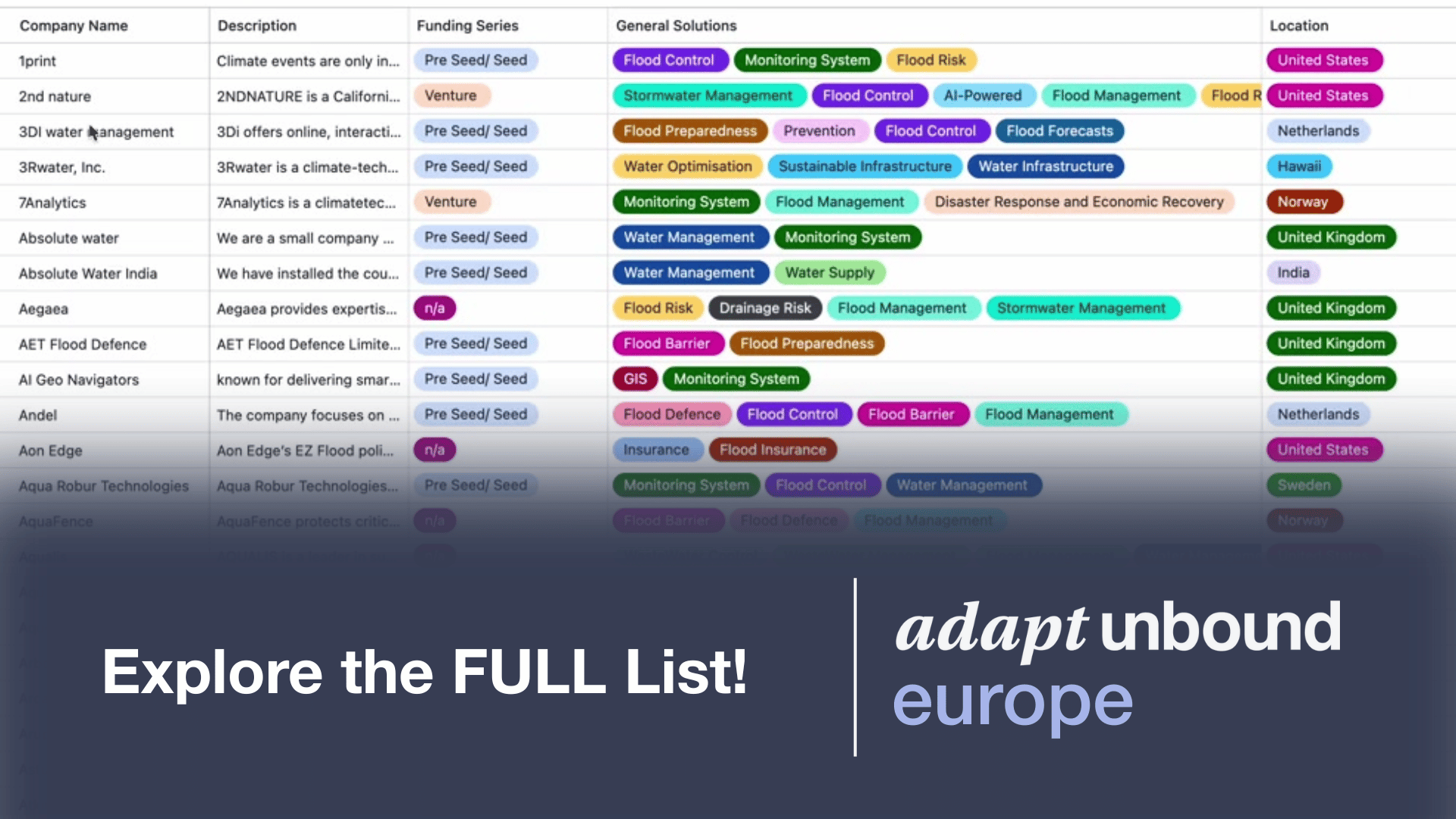EVENT CANCELLED: Read Statement
The Global Flood & Water Risk Summit
2025 Europe summit is the premier gathering for global leaders, innovators, and investors committed to shaping a resilient future in the face of escalating physical water risks.
Featured Speakers:
Meet the flood and water risk leaders sharing their insights on stage.

Nanco Dolman
Lead Author of AR7 Special Report
IPCC, Deltares


Elisha Herrmann
Head Of Solutions, Business Applications
Amazon Web Services


Rowan Douglas
CEO, Climate Risk & Resilience
Howden


Lisbeth Zacho
Founder & Managing Partner
Nordic Impact Funds


Josh Graham
CEO
EHAB


Amar Rahman
Global Head Climate & Sustainability
Zurich Resilience Solutions


Sacha Stolp
Director, Climate Adaptation,
City of Amsterdam

.png)
Tim Christophersen
Vice President, Climate Action
Salesforce

In Numbers
of attendees are C-Suite or Director-level decision-makers
organisations represented across flood resilience and water risk industries
average annual flood losses globally
Summit Themes Include
Rethinking Residential Stormwater Management
How can we safeguard populations and future-proof homes?
Future of Flood Insurance
How Companies Are Redrawing the Risk Map
Water Risk Investment Trends in 2025
From geospatial to flood barriers, where’s the money flowing?
2025 Sponsors
Industry leaders supporting innovation in flood and water risk chose the summit to maximise impact.

Unrivalled Connections
Unmatched Insights
Unbound Opportunities
Over 200 Flood and Water Risk Leaders
Engage with a highly senior audience, including corporate leaders, innovators, policymakers, and financiers. Schedule dedicated 1-on-1 meetings, participate in exclusive networking sessions, and leave with invaluable industry connections and insights.
Hosted at the Epicentre of Water Resilience Expertise
The Netherlands is widely recognised as one of the world’s foremost leaders in flood and water resilience. Nearly a third of the country lies below sea level, making water management not just an environmental concern but a national imperative. Over centuries, the Dutch have pioneered cutting-edge infrastructure, nature-based solutions, and innovative governance models that are studied and replicated worldwide.
An Unforgettable Experience
We take pride in delivering exceptional business events. With world-class venues and curated experiences in the most influential cities, we guarantee an event that is unforgettable and fast-tracks your business objectives.
Don't Just Take Our Word For It
See what past delegates have to say about their experience at Unbound Summits:
2025 Agenda
Two full days of action-packed insights and networking.
Wednesday 10th December
Morning
- What were the most relevant outcomes from COP30 on adaptation and resilience, and how are they shaping the global agenda for climate-proofing regions?
- How can the political momentum and finance commitments from COP30 be translated into region-specific adaptation strategies, particularly in the context of water-related extremes?
- What policy tools and funding mechanisms are proving most effective in addressing growing flood and water risks, and how are they being implemented across vulnerable and high-risk regions?
- What practical steps are regions taking to build long-term resilience to flooding and water stress, and how can these efforts be better supported through national policy and international cooperation?
Nanco Dolman - Lead Author of AR7 Special Report on Climate Change and Cities, IPCC, Deltares
Willem Jan Goossen - Policy Officer, DG CLIMA.E1, European Commission
Bart van den Hurk - Co-Chair of IPCC Working Group II - IPCC
- How are insurers evolving their underwriting strategies and catastrophe models in response to accelerating flood risk?
- What are the limits of insurability in areas of extreme risk? What new parametric insurance models are emerging for regions or sectors that may soon become “uninsurable”?
- What new public-private partnerships are emerging between insurers and governments to support resilient infrastructure and pre-disaster financing?
- How is the industry using climate analytics, satellite data, and AI to improve flood prediction and drive investment into adaptation rather than just payouts?
Jonathan Kassian - Head of Research, Flood Re
Rowan Douglas - CEO Climate Risk & Resilience, Howden
Stephanie Race - Founder & CEO, Earth Analytics Group
Amar Rahman - Global Head Climate & Sustainability, Zurich Resilience Solutions
- How do current European climate adaptation and resilience disclosure regulations address flood risk, particularly in relation to the EU Water Framework Directive (WFD) and national flood risk management plans?
- What challenges and gaps do regulators, companies, and investors face in disclosing flood-related exposures, adaptation strategies, and alignment with WFD objectives?
- Are existing disclosure frameworks sufficient to reflect growing flood risks due to climate change? How might they be enhanced to better capture flood adaptation measures, resilience planning, and compliance with EU directives such as the WFD?
- How do European standards for flood risk disclosure compare with global frameworks (e.g., TCFD, ISSB, SEC)?
Sudeshna Raychaudhuri - Senior Specialist, Climate - Principles for Responsible Investment
Laura Zizzo - Founder & Chief Strategy Officer, Manifest Climate
Joe Ray - Head of Water, CDP
- How is coastal flooding and sea level rise disrupting both maritime operations and port infrastructure, and what are the cascading risks for global supply chains and trade-dependent economies?
- What strategies have helped ports like Rotterdam achieve world-class flood resilience, and how are these models being adapted to protect maritime and logistics systems in more vulnerable regions?
- How are investors, insurers, and regulators assessing flood risk across the full maritime-port interface, and what financing models are emerging to align decarbonisation with long-term resilience?
- Where is marine electrification advancing alongside flood-ready port design, and what integrated approaches are proving most effective in future-proofing vessels, charging systems, and coastal logistics hubs?
Organisations invite attendees to participate in intimate discussions around key challenges relating to flooding and coastal adaptation. The session will culminate in the sharing of new ideas between the delegation.
Josh Graham, Co-Founder & CEO, EHAB
Darren Clifford, Founder & Managing Director, Adapt [us] Capital
Afternoon
- What short and mid-term flood resilience measures are being adopted by cities facing high risk but long infrastructure timelines?
- What examples are there of adapted buildings that have saved lives and/ or money?
- In what ways are cities balancing nature-based solutions with engineered systems to build layered, flexible defenses?
- What lessons can be taken from cities like Venice, Amsterdam, and Hamburg, and what advice do actors have for other cities to implement similar strategies within their own fiscal and regulatory constraints?
Sacha Stolp - Director, Climate Adaptation, City of Amsterdam
Ellen van Bueren - Professor of Urban Development Management, Delft University of Technology
Simone Sandholz - Head of Urban Futures and Sustainability Transformation Programme, United Nations University (UNU-EHS)
Start-up your engines! Impact-driven investors will be stationed across breakout tables, ready to meet flood and water resilience innovators. Start-ups will rotate between investors, each having 4 minutes to pitch their solution before moving to the next table.
- How are countries across the tropics, especially island nations and low-lying regions, navigating the growing impacts of water extremes including flooding, drought, landslides, and sea level rise, often within the same fragile ecosystems and communities?
- What locally led, nature-based, or Indigenous solutions are emerging to manage these overlapping risks, and how are they being scaled or adapted across tropical regions?
- What investments and policy shifts are needed to strengthen and climate-proof critical infrastructure in tropical regions, where weak systems often worsen the impacts of water-related disasters?
- How can adaptation efforts better integrate infrastructure, ecosystem protection, and community resilience to address the compound risks facing tropical countries on the frontlines of the climate crisis?
Lisbeth Zacho - Founder & Managing Partner - Nordic Impact Funds
- What are the emerging opportunities for using geospatial AI and earth observation data to support decision-making at national and local levels?
- How can actors leverage AI to improve flood forecasting and asset-level risk mapping?
- How are European-led satellite programmes like Copernicus driving flooding risk assessment and adaptation planning?
- What collaborative project between public agencies, private tech firms, and research institutions enhancing the accuracy of the data and predictions?
Steven Tebbe - Strategic Advisor, FINOS | OS-Climate Fund, The Linux Foundation
Rodrigo del Potro - Director of European Business Unit, Xcalibur Smart Mapping
Kian Mirshahi - Founder & CEO, Mayday.ai GmbH
Start-ups will get on stage to pitch their selected solution to an audience of investors and water leaders. They will have 10 minutes each.
- What are the latest trends in cumulative investment across water-tech and flood prevention? Where are the biggest gaps?
- Who are the top investors driving capital into this industry, and what standout deals shaped the market in 2024/25?
- How is investment distributed across early-stage innovation, project deployment, and large-scale infrastructure?
Charles Bondu - Lead Adaptation Analyst, Sightline Climate
- VC’s are under pressure due to conventional VC models often misaligning with climate adaptation projects. What are the implications for innovation and innovators?
- What roles can corporate venture capital, family offices, and foundations play in filling the investment gap in this space?
- How can the investment community overcome the lack of shared language and education around climate resilience among non-traditional investors like family offices?
- What needs to change in how investors define success in resilience finance, especially when compared to mitigation-focused ventures?
Ben Tam - Isle Utilities, CEO
Darren Clifford - Founder & Managing Director, Adapt [us] Capital
Sam Baker - Investor, Planet A Ventures
Thursday 11th December
Morning
The Netherlands is taking a significant step toward securing a resilient and future-proof river system with the launch of the Room for the River 2.0 programme. During this conversation, we look back on the success of the 1.0 programme as it relates to flood risk, and discuss the improvements and adaptations currently in consideration for the next iteration.
- 5-minute case setting
- 25-minute breakout discussion
- 20-minute feedback sharing with the audience
- What are the most acute water risks to global supply chains, and how are corporations addressing them today?
- What role are tools like climate scenario modeling, geospatial AI, or insurance partnerships playing in corporate risk reduction?
- How are corporates supporting flood adaptation for their suppliers, especially in high-risk regions?
- How are emerging regulations reshaping how they manage and disclose supply chain climate risk?
Daniel Schmitz-Remberg, Managing Director, DSR & Partners
Dr Paul Munday - Global Adaptation And Resilience Lead, S&P Global Ratings
Elisha Herrmann - Head Of Solutions- Business Applications (Worldwide), Amazon Web Services (AWS)
Format: Keynote Presentation
- How can nature-based solutions drive climate adaptation while delivering co-benefits for biodiversity, communities, and long-term resilience?
- What lessons from Generation Restoration can guide future investment and policy in ecosystem restoration?
- How is Salesforce investing in watershed protection and coastal resilience through forest and mangrove restoration?
- How do we leverage the power of AI for nature and climate?
Tim Christophersen – Vice President, Climate Action, Salesforce
- How are energy and grid operators addressing flood risks, and how are consortia like ENTSO-E shaping resilience standards across Europe?
- In what ways is the EU Energy Union strengthening cooperation and security of supply when extreme flooding disrupts national systems?
- Which advances in digitalisation, decentralisation, and storage are enabling energy assets to withstand and recover faster from flood events?
- How do floods impact renewable generation assets (offshore wind, hydro, solar) and what resilience strategies are essential to keep Europe on track for net zero?
Tatiana Mitrova - Research Fellow, Center on Global Energy Policy
5 start-ups will pitch their selected solution to an audience of investors and water leaders. They will have 10 minutes each.
An innovative start-up and one of their partners/ investors sits down to share learnings about scaling a novel flood resilience solution.
- What major water challenge did the solution tackle, and what made this partnership or exit the right path forward?
- What were the pivotal moments or decisions that helped turn early traction into long-term scale or acquisition?
- How did both sides align on vision, values, and execution, and what tensions had to be managed?
- What would each company do differently next time to drive faster growth, smoother collaboration, or greater impact?
Organisations invite attendees to participate in intimate discussions around key challenges relating to flooding and coastal adaptation. The session will culminate in the sharing of new ideas between the delegation.
Josh Graham, Co-Founder & CEO, EHAB
Afternoon
- What have recent major flood events revealed about preparedness, coordination, and emergency response?
- Which innovative technologies are helping to aid emergency services and save more lives?
- What strategies are in place to ensure essential services like hospitals still run during and after such events?
- How are EU and national emergency mechanisms evolving to meet escalating risks?
- What strategies are essential for ecosystem recovery?
- What new solutions are allowing us to capture, store and preserve water during flash floods and droughts alike?
- How are businesses rethinking water as core to risk management, not just a utility input?
- How can companies partner with cities, utilities, and regulators to build circular water economies?
- Who is funding these new projects, and which decision-makers are needed in order to implement change at the pace that’s needed?
- What are the top water risks affecting agricultural productivity in Europe today, and how are they being addressed? How are these risks already being addressed at farm and regional levels?
- What role does smart irrigation technology play in balancing water scarcity and flood risk?
- How can the EU Common Agricultural Policy or national programs better incentivise resilience, not just sustainability?
- What innovations, whether technology, finance, or farming practice, hold the most promise for Europe’s agri-food resilience over the next decade?
Emily Franklin - Senior Consultant & Project Manager, reNature
Volkert Engelsman - Founder, Robin Food Coalition
- What new models or data are helping the financial sector assess flood resilience more accurately, and how can the industry as a whole better measure and communicate the long-term financial returns of avoided flood damages?
- What financing tools, such as green bonds, resilience bonds, blended finance, are banks already using to de-risk large-scale resilience projects?
- In what ways has government funding, development banks, and philanthropy catalysed private capital for high-risk or first-of-a-kind projects?
- What lessons can be drawn from the blue economy and ocean-focused adaptation investments, which often operate outside conventional VC norms?
Émilie Bécault - Senior Manager, Subnational Climate Finance, CDP
Elarefbellah Kaal - Climate Change Specialist, The World Bank
Location & Venue
Recognised for its innovative and forward-thinking leadership in flood resilience and water reisk, Amsterdam sets the perfect stage for exploring solutions. The Venue Collective HQ offers a sustainable and inspiring setting—an intimate space ideal for connecting with like-minded climate leaders.
Nearest Stations
- Europaplein Metro Station
- Amsterdam RAI Station
Closest Airports
- AMS: 20 minutes by cab, 25 minutes by train
- RTM: 65 minutes by cab, 80 minutes by train
Hotel Recommendations
- Budget concious: XO Hotels Couture
- Mid-Range: Novotel Amsterdam City
- High-End: Hotel Okura Amsterdam
Pricing & Access
One ticket provides access to the best in the flood and water risk industry. Save €150 by signing up now.
Need a Discount?
Click on the relevant group below, fill out a contact form and we will be in touch!
Super Early Bird (Closes 17 October)
Early Bird (Closes 14 November)
General Admission
€695 + VAT
€895 + VAT
€1045 + VAT
Need a discount?
Click on the relevant group below, fill out a contact form and we will be in touch!
What’s On?
Carbon Unbound West Coast hosts two full days of action-packed sessions and networking, here's your laser-focused CDR agenda.

Thursday 24th October
Morning
Coming Soon...
Afternoon
Coming Soon...
Friday 25th October
Morning
Coming Soon...
Afternoon
Coming Soon...
2025 Marketing Partners





Have Questions? Read our FAQs
Need more answers? Contact our team by clicking the button below.
Will the summit be available via live stream or on-demand?
We believe in the irreplaceable value of in-person connections. Virtual events often limit engagement and focus, so Adapt Unbound Europe 2025 will not be streamed online. However, summit audio content will be available post-event in our Library.
Who qualifies for discounted tickets?
We offer discounted rates for qualifying start-ups, NGOs and academics. To see if your organisation meets the criteria, including employee count, funding stage, and industry focus, please contact us at delegates@adaptunbound.com to apply.
What benefits are included with a ticket?
Your ticket grants full access to the two-day summit, including all keynote sessions, discussions, and debates. Additionally, you will receive access to our networking app (three weeks before and four weeks after the summit), as well as complimentary breakfast, lunch, networking break refreshments, and an exclusive closing networking session.
Can I get a refund if I can’t attend?
You can also cancel and request a refund up to 30 days before the event with a 15% cancellation fee. After this period, refunds are unavailable. You can transfer your pass to a colleague at any time.
Do you have an event app, and am I able to book 1-1 meetings?
Yes! Our dedicated networking tool is available to all attendees. You’ll receive access three weeks before the summit, enabling you to connect with fellow attendees and schedule 1-on-1 meetings to maximise your networking experience.
How do I apply for a press pass to cover Adapt Unbound Europe?
For media inquiries and press accreditation, please contact corby@unboundsummits.com for more details on attending Adapt Unbound Europe 2025 as a member of the press.
Share with a Colleague
We're better together. Adaptation solutions require action from all areas of science, business and politics.
Copy URLGet in Touch
Looking for hotel recommendations, more details, or session information? Don’t hesitate to reach out.


.svg)



.png)


.png)


.png)


.png)










.png)




.png)
.png)












